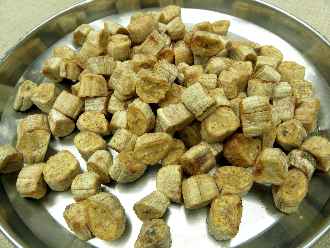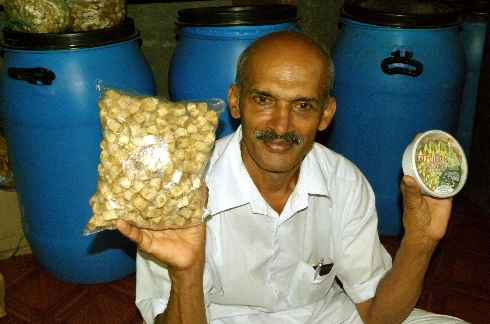Parameshwara Hegde Tumbemane has reasons to be happy. Since the last one year, he hasnt taken his banana crop to the market. They sell it in a value added form by making sukeli dehydrated banana bits. One of their neighbourhood farmers buys this in bulk and does the marketing.
This requires good amount of labour, adds his wife Vinutha. But she enjoys it because This is a work that doesnt require us to go out of our houses. Quite suitable for housewives like me.
Banana is an important intercrop amidst arecanut (supari) in this part of Uttara Kannada district of Karnataka. Since the beginning of nineties, this crop was totally ravaged due to katte roga - the viral disease called bunchy top. It is only since the last 5 years, banana crop has slowly come out of that viral attack.

![]() Sukeli, the dehydrated banana . Pic: Shree Padre.
Sukeli, the dehydrated banana . Pic: Shree Padre.
Sukeli, suka keli or dehydrated banana isnt a new product for the district. In earlier decades it was produced in a crude form for household consumption. Recent introduction of dryers in the district has facilitated sukeli production in a methodic way and for the market.
Farmers Shripad G Hegde Uratota and Mahesh Hegde Tumbemane were the first to get a drier installed four years ago. Their experiments with sukeli production and trial marketing have given confidence to the neighbors. Now, five families of this area are producing sukeli using their home grown banana.
Sukeli production itself doesnt keep the driers busy all the time. There is sufficient spare time left. One additional product these families have producing during last few months is jackfruit bits.
Flakes of the soft fleshed jackfruit times locally called as ambali generally doesnt have much use. It is not preferred for table purpose. More than often these type of fruits go wasted.
Trupti has got an indent for bulk jackfruit bit production from a sweet-meat shop owner of Tumkur. Flakes of jackfruit s made into a pulp and dried in the drier. Later, using a cutting device, the jackfruit mats are cut into small pieces.
Unripe banana pappad is another product these housewives are now producing using the spare capacity of the drier.
![]() Two self help groups Prerana Svasahaya Sangha comprising of Mahesh Hegde, Parameshwar Hegde, Narasimha Bhat, Manjunath Hegde and S G Hegde and Shrimatha Svasahaya Sangha comprising of their wives are utilizing their spare time for sukeli production. Well ripen banana fruits are peeled and dried in the drier for two days. After two days drying, it is neatly cut into pieces using a small manual gadget. One round of production totally takes 4-5 days. In a month, four rounds of production are generally done.
Two self help groups Prerana Svasahaya Sangha comprising of Mahesh Hegde, Parameshwar Hegde, Narasimha Bhat, Manjunath Hegde and S G Hegde and Shrimatha Svasahaya Sangha comprising of their wives are utilizing their spare time for sukeli production. Well ripen banana fruits are peeled and dried in the drier for two days. After two days drying, it is neatly cut into pieces using a small manual gadget. One round of production totally takes 4-5 days. In a month, four rounds of production are generally done.
Though as banana fresh fruit is widely available, the dry banana is a new product at the market. Grown by and large organically, it is quite nutritious. It is easy to carry while traveling and is good for providing quick energy, claims Shripad Hegde. Each 100 grams of sukeli has 83.7 gram of carbohydrates, 3.56 gms of Protein, 170 mg Calcium, 90 mg of Phosphorous in addition to a dash of iron. Without adding any chemical or other preservatives, sukeli has a shelf-life of eight months.
Shripada has shouldered the responsibility of marketing this value added product. Since he has been producing sukeli off and on from two years, he was able to identify some buyers. He buys sukeli in bulk from other households keeping a margin. Apart from 100 gram packets, one Kg packs are done for distant markets like Hubli, Tumkur, Shimoga and Bangalore. The 100 gram packets are sold for Rs 20. Sales at local Sirsi town are only name-sake.
A kg of sukeli is sold for 150 Rs. At an average, this brings us an added income of 30% points out Mahesh Hegde. Of course, the percentage will vary depending on the variety of banana fruit used for drying. Of late, a slightly different type of product is made for the distant consumers. It is called Masala Sukeli. To make this, a dash of few spices are applied to the regular product.
Another new experiment is making sukeli available in small 200 gram Polypropylene packets under the brand name Trupti. Being sold at s 40, this, according to Shripad Hegde, has good take-home demand in Sirsi town itself. After the introduction of these professional looking packets, selected hotels, bakeries and sweet-marts sell this. According to Hegde, most of the customers buy sukeli as a time-pass product.

Shripada Hegde Urathota showing the products. Pic: Shree Padre.
The drier runs on agriculture waste that is abundantly available in supari gardens. Depending on their requirements, these families have bought 25 or 50 Kg capacity driers. For example, Mahesh Hegde has bought the bigger drier for Rs 43,000. Syndicate Bank has given a loan of Rs 2 lakh Rs that includes cost of driers and working capital.
One Kg of ripe fruit makes 250 grams of sukeli. Being farm families, this value addition activity is done using only family labour and spare time. As such, this is a limitation. On a few occasions, these families had brought banana from wholesale market. In the last one year, all the five families put together have produced six quintals of sukeli. The demand is good. We wanted to produce one tonne. But could make only 60% of our target, says Shripada Hegde.
Dehydrated banana is a new product for rest of Karnataka state. As such, Trupti is getting more and more trade enquiries. Being a side-profession, this small group is not able to promote sukeli in a big way. In fact, it can be a god additive for dry fruit salad. With demonstrations and proper product promotion, it can be used to make payasa and deserts like banana burfi. In fact, Trupti makes sukeli in a diamond shape for supplying to Tumkur sweet meat shop for the preparation of banana burfi.
Sukeli is a well-known household product in our district now. The raw material banana is grown everywhere. Since dry banana is popular with children, many farmer families are regularly producing it, says Arunkumar Joshi whose Joshi and Company of Sirsi is making dryers. In the last one decade, this company has installed around 500 driers in the nook and corner of Uttara Kannada district. According to Joshi, apart from Trupti, there are half a dozen farming families who are regularly producing sukeli for the market.
Points out Shivananda Dikshith, Senior Manager, Syndicate Bank Regional Office at Karwar, It is really a product with much more scope. There is very good demand. But the shelf life has to be improved. Adds he, Now that the farming sector is in great crisis, this side-profession that can be run by family labour can be a good model for Uttara Kannada.
Shivanands observation is right. Most of the arecanut farmers in Uttara Kannada grow bananas as intercrop. Hundreds of agricultural driers are installed at arecanut farms for different purposes. As such, production of sukeli is only two steps away from many households.
Farmers themselves adding value to the crop they have grown. Truptis small success can be an inspiration and a trend-setter to whole of Uttara Kannada district in the years to come.

